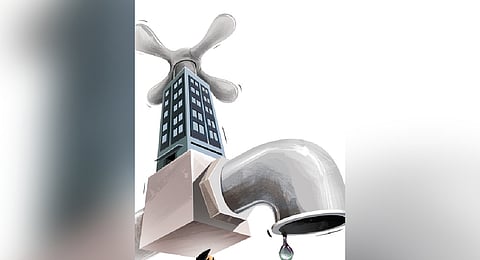

BENGALURU: Boson Whitewater, a water utility company, has launched India’s first indirect potable water reuse project in partnership with Biome Environmental Trust. This initiative in Devanahalli will convert treated water from sewage treatment plants (STPs) into high-quality drinking water by using managed aquifer recharge, a method aimed at sustainable water reuse.
The project, functional for over a year, produces 6.4 lakh litres of drinking water a day, and supplies it to residents of Devanahalli. It can recover between 50 and 75% of potable water from the STP. However, the remaining water is sent back to the STP and the system does not send any water to the drain.
Vikas Brahmavar, co-founder of Boson Whitewater, told TNIE that through the project, treated water from an STP is pumped into Bagalur Lake, where it is blended with rainwater. From there, water is piped to Sihineeru Kere Lake in Devanahalli for further dilution with rainwater. This mixture then seeps through the earth, recharging the local aquifer. Water is then extracted from the aquifer through a well and shallow borewells, treated again, and finally supplied to houses.
The project is called “indirect potable water reuse” because it incorporates environmental buffers like lakes for dilution and an aquifer for natural filtration before water undergoes final treatment and distribution.
The project is part of a larger mission to restore 65 lakes across Bengaluru using treated water and rainwater. In Devanahalli, the project involved reviving an old well, drilling borewells, and setting up water treatment plants in two phases, ultimately supplying around 6.4 lakh litres of water daily to 45,000 residents.
The project is also energy-efficient, using only 0.25 units of electricity per 1,000 litres of water, and aligns with the Union government’s Amrut 2.0 guidelines, which focus on sustainable urban water management. Introduced in 2021, Amrut 2.0 aims to enhance infrastructure for water supply, sewage treatment, and rejuvenation of water bodies.
“To minimise the use of electricity, the project is avoiding complex systems such as reverse osmosis and ultrafiltration, instead relying on a simpler, four-stage treatment that meets IS 10500 standards. This approach also ensures that residents receive safe, treated water while conserving energy and keeping the system manageable for future expansion,” Vikas said.
Currently operational in Bengaluru, Hyderabad, Pune, Chennai and Coimbatore, the system can be installed in any apartment where there are over 200 families and has a functional STP.
The system, however, cannot be installed in independent homes or smaller apartments as these structures will not have STPs. It is a tertiary treatment system designed to only improve the quality of treated water from STPs.